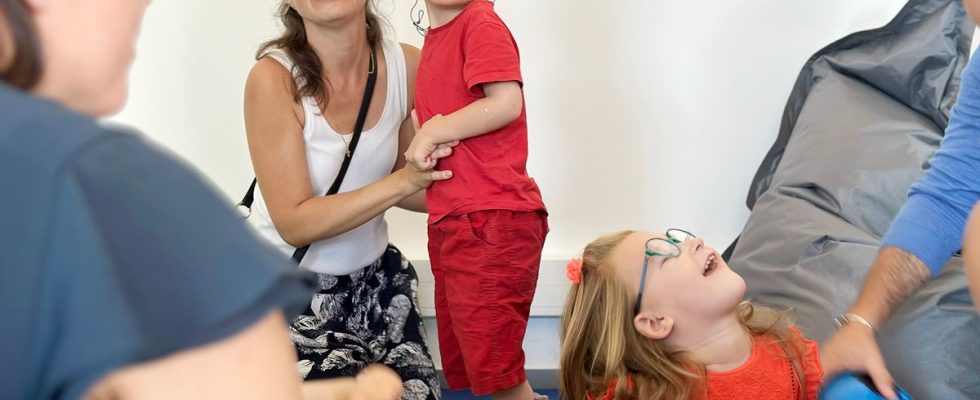Wide-eyed, attentive to everything, Bader observes this new world that is opening up to him. The bright colors of the activity mats, apple green and electric blue. Crates overflowing with balloons and stacking bricks. Her classmates. For the very first time, this little 4-year-old Antibois returned to school on Tuesday morning. ” A real. It was a dream for us. And, today, with his dad, we are really very moved. It is symbolic. Our child finally has an existence in social life. He is part of society, ”says his mother, Yousra Dhib, tears on her cheeks.
His son, who suffers from Sjögren-Larsson syndrome, a rare genetic disease “affecting the skin, the limbs, the mind, the verbal”, was able to integrate, with five other children, suffering like him from mental and motor deficiencies, a “Teaching unit for students with multiple disabilities” (UEEP). A suitable environment at the heart of a public school group, the Eugène-Olivari school, in Biot (Alpes-Maritimes).
At least one of these units per academy
And this is a first in the Academy of Nice. “We are among the pioneers in France, boasts Laurent Ronchail, National Education Inspector in charge of students with disabilities. Ultimately, the ambition of the Interministerial Disability Committee, whose ambition is to make schooling ever more inclusive, is to create one of these outsourced units at least per academy. We will therefore certainly be called upon to deploy others in the years to come. »
In Biot, the project, pushed by the town hall, took more than two years to materialize. It has set up a link with the Regional Health Agency (ARS) Paca and the Medical-Educational Institute (IME) Les Hirondelles, nearby, with the possibility that caregivers, accustomed to these children, can intervene in case of need.
“Make them visible in the educational community”
In the former library of the Eugène-Olivari school, refurbished to accommodate up to twelve children, with a multipurpose room and another for rest, Maëline, Lucas, Charlie, Julien, Mila, Bader, and their parents, who all had to adapt their lives to the handicaps of their little ones, take their marks. They also get to know the mistress. Ramla Beji, a “regular class” school teacher, applied to inaugurate this UEEP and offer them “à la carte” half-days. “Some will only come for a few hours a week. Others a little more. Everything will be adaptable, in consultation with the families, ”explains the teacher, who will be supported by two specialized educators and a support for students with disabilities (AESH).
Unlike them, the young woman has not followed any specific training. She plunges into a certain unknown. What is certain is that the moments she will spend with these six schoolchildren will have absolutely nothing to do with the lessons she used to teach. “We will be far from the National Education programs. With these children, communication is sometimes non-existent or at least very difficult. The primary objective will be to try to develop their way of speaking, to socialize them and above all to make them visible in the educational community. The purpose of these units is also that the other children in the school get used to seeing the handicap and accepting it as soon as possible. »
“A virtuous perspective”
Everyone will be able to meet during recess, but also directly in the classroom. “In a virtuous perspective, there will be moments of inclusion with other teachers and other students,” says Laurent Ronchail.
“It’s a big step. It is a real symbol. Inclusion in a certain normality, ”says Matthieu Cocq, the father of Charlie, 7, who suffers from a neuromotor disability. “It’s due to a deficiency in PDH [pyruvate déshydrogénase], he says. Her progress will remain limited in any case but, socially speaking, decompartmentalising her, allowing her to be with children like her and not like her, that can only be beneficial. The Academy of Nice, which evokes an “experiment”, has planned to draw up an initial assessment of this unit in December, before considering the creation of other structures.

